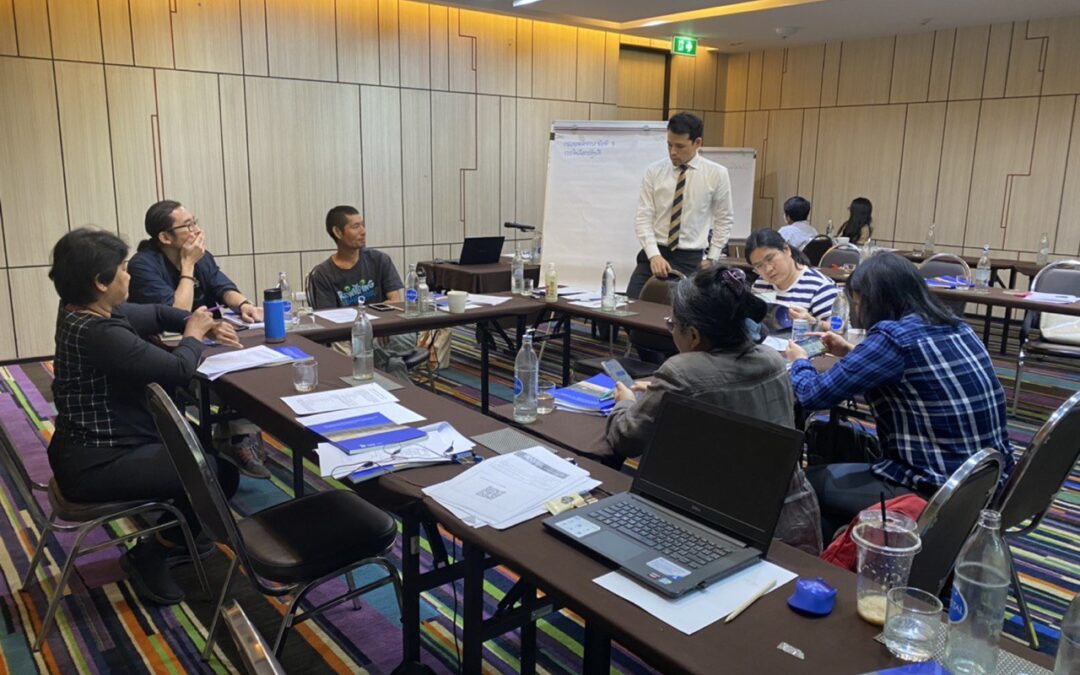
Sep 14, 2020 | Advocacy, News
On 13 September 2020 the ICJ hosted a workshop on the impacts on economic, social and cultural rights associated with the development of Special Economic Zones (SEZs) in Thailand. Lawyers, members of civil society organizations and academics from across Thailand attended the Workshop.
The event began with an introduction to ICJ’s report – the Human Rights Consequences of the Eastern Economic Corridor and Special Economic Zones in Thailand – and outlined the deficiencies in the legal and regulatory framework governing economic development in Special Economic Zones and the Eastern Economic Corridor.
During the group discussions, participants were introduced to the international laws and standards that are applicable in the context of Thailand and can be applied to allegations of human rights violations and negative environmental impacts. They were urged to use these standards for their advocacy work.
These included economic, social and cultural rights contained in the International Covenant on Economic, Social and Cultural Rights (ICESCR), to which Thailand is a State party and other internationally recognized principles, including:
- Right to an adequate standard of living and housing under article 11 of the ICESCR, General Comments 4 and 7 of the Committee on Economic Social and Cultural Rights and the Basic Principles and Guidelines on Development-Based Evictions and Displacement – which stress the need to provide adequate legal protection from forced eviction, due process, alternative accommodation, and access to an effective remedy of those that are affected by eviction orders;
- Human rights obligations that are exercised in relation to the environment, such as obligation to facilitate public participation in decision making related to the environment, and duties to protect human rights defenders and to conduct the prior assessment of the possible environmental impacts of proposed projects and policies; and
- Rights to and at work under article 6 to 8 of the ICESCR, General Comment No. 19 and 23 of the Committee on the Economic, Social and Cultural Rights, and several ILO Conventions, particularly regarding rights abuses suffered by migrant, seasonal and subcontracted workers, as well as restrictions on freedom to join and form trade unions.
At the conclusion of the Workshop, participants exchanged views on strategies and collaboration for action to mitigate potential impacts of the Special Economic Zones and the Eastern Economic Corridor and to advance the protection of economic, social and cultural rights.
Further reading
Thailand: laws governing development of Eastern Economic Corridor and Special Economic Zones fail to adequately protect human rights – ICJ report
Thailand: ICJ hosts discussion on human rights consequences of Special Investment Zones
ICJ and Chiang Mai University discuss Special Economic Zones in Myanmar and Thailand
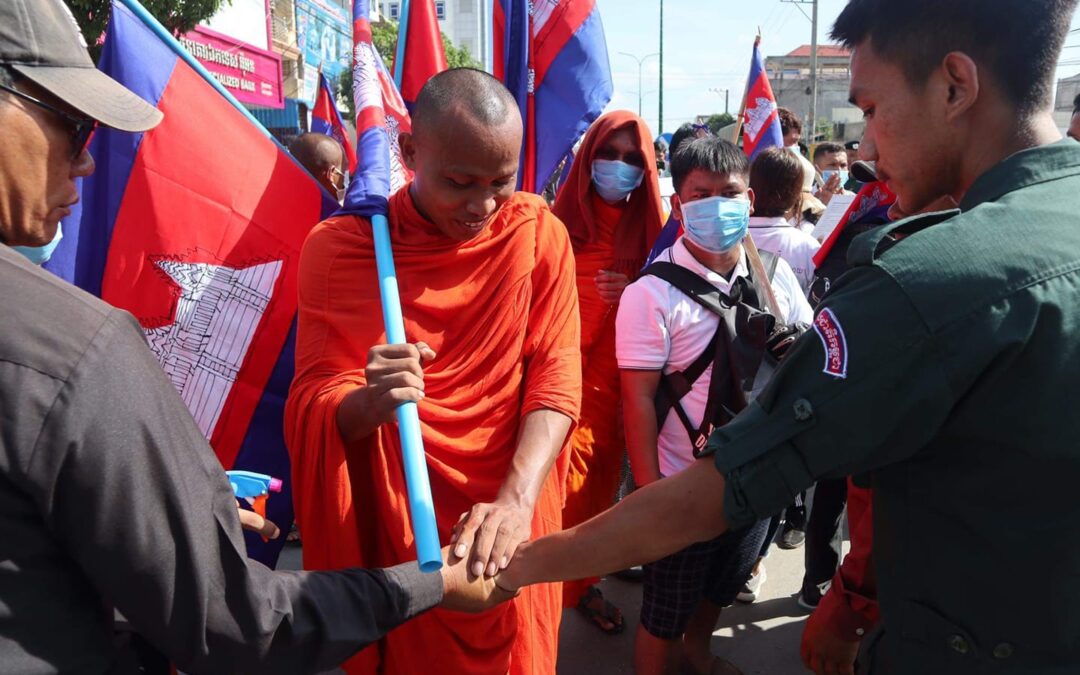
Sep 11, 2020 | News
Today, the ICJ condemned an ongoing and heightened crackdown on civil society activists and human rights defenders in Cambodia, and called on the Royal Government of Cambodia (“RGC”) to cease arbitrary arrest and other harassment of individuals for merely exercising their human rights and fundamental freedoms.
From end-July to early this week, at least eleven activists have been arrested and detained on spurious charges in an invigorated attempt by authorities to silence critical dissent in the country.
“The Cambodian authorities in recent days have ratcheted up their abuse of domestic laws to target human rights defenders and perceived critics of the government. We fear that without a robust international response, the situation will only deteriorate further,” said Kingsley Abbott, ICJ Senior Legal Adviser.
“They are now targeting youth in particular, in an apparent bid to curtail their use of social media to amplify dissatisfaction with the ruling regime. Instead of attacking them, the government needs to stop and listen to their people,” he added.
Several arrests have been linked with the detention of prominent union leader, Rong Chhun. On 31 July, Rong Chhun, President of the Cambodian Confederation of Unions, was arrested at his home in suspected retaliation for comments he had made alleging loss of community land in relation to demarcation of the Cambodian-Vietnamese border. He was thereafter charged with “incitement to commit a felony or disturb social security,” under articles 494 and 495 of the Criminal Code. He is currently in detention in Phnom Penh’s Correctional Centre 1.
On 13 August, Hun Vannak and Chhouen Daravy, founding members of the Khmer Thavrak youth activist group, were arrested in relation to a rally they had held outside Phnom Penh Municipal Court in support of Rong Chhun. Daravy was reportedly slapped, then grabbed and hit before being pushed into a vehicle during her arrest. Security officials also reportedly beat and kicked at people in the rally to disperse the crowd, injuring about ten individuals.
On 6 September, Buddhist monk Venerable Koet Saray and Mean Prommony, Vice-president of the Khmer Student Intelligent League Association, were arrested in apparent connection with a rally they had been organizing to call for Rong Chhun’s release. On 7 September, Khmer Thavrak activists Tha Lavy and Eng Malai were arrested. Tha Lavy was arrested on arriving at a protest at Freedom Park. Eng Malai was arrested the day she had left the UN Office of the High Commissioner for Human Rights’ Cambodia office, where she had raised her security concerns.
Simultaneous arrests of environmental rights activists and a rapper evidence a wider crackdown beyond the case of Rong Chhun. On 4 September, three members of environmental rights group Mother Nature Cambodia, Thun Ratha, Long Kunthea and Phuong Keorasmey were arrested. They were thereafter charged with incitement under articles 494 and 495 of the Criminal Code. On the same day, rapper Kea Sokun was arrested in Siem Reap province and similarly charged with incitement, in apparent connection with a popular song he had released on YouTube, concerning land at the Cambodian-Vietnamese border.
On 7 September, the Ministry of Interior issued a statement denouncing Khmer Thavrak and Mother Nature Cambodia as unauthorized organizations, calling on the responsible authorities to prosecute them.
The ICJ is concerned that the groups are being targeted for allegedly operating without being registered in accordance with the Law on Associations and Non-Governmental Organizations. The requirements under this law are non-compliant with international law and standards that protect human rights and fundamental freedoms, as the ICJ has previously pointed out. The law impermissibly restricts the ability of civil society members to exercise their rights to freedom of association and expression.
The ICJ recalls the responsibility of Cambodia, as expressly stated in the UN Human Rights Defenders Declaration, to “take all necessary measures to ensure the protection by the competent authorities of everyone, individually and in association with others, against any violence, threats, retaliation, de facto or de jure adverse discrimination, pressure or any other arbitrary action as a consequence of his or her legitimate exercise of the rights referred to in the present Declaration.” These rights include, among others, freedoms of expression, opinion, peaceful assembly, association and political participation.
“Far from protecting these rights, the government has been systematically violating them,” said Abbott.
“The recent arrests signal yet another sign of further regression that needs to be called out by the international community, including by partners, missions, UN agencies and financial institutions.”
On 7 September, the UN Special Rapporteur on Cambodia expressed concerns about the recent arrests and also highlighted that she “has been closely following reports that seven different CSOs have been searched or informed of pending visits by the authorities since last week.” Similarly, over the past few days, the UN Special Rapporteur on Human Rights Defenders has expressed concern about the crackdown, stating “peaceful protest is not a crime”.
Contact
Kingsley Abbott, Senior Legal Adviser, ICJ Global Redress & Accountability Initiative e: kingsley.abbott(a)icj.org
See also
ICJ and 31 organizations jointly urge Governments to call for respect of human rights in Cambodia, 22 July 2020
Cambodia: State of Emergency bill violates the rule of law’, 8 April 2020
Misuse of law will do long-term damage to Cambodia, 26 July 2018
‘Cambodia: deteriorating situation for human rights and rule of law (UN statement), 27 June 2018
‘Cambodia: the ICJ condemns Senate’s approval of draft Law on Associations and NGOs, 24 July 2015
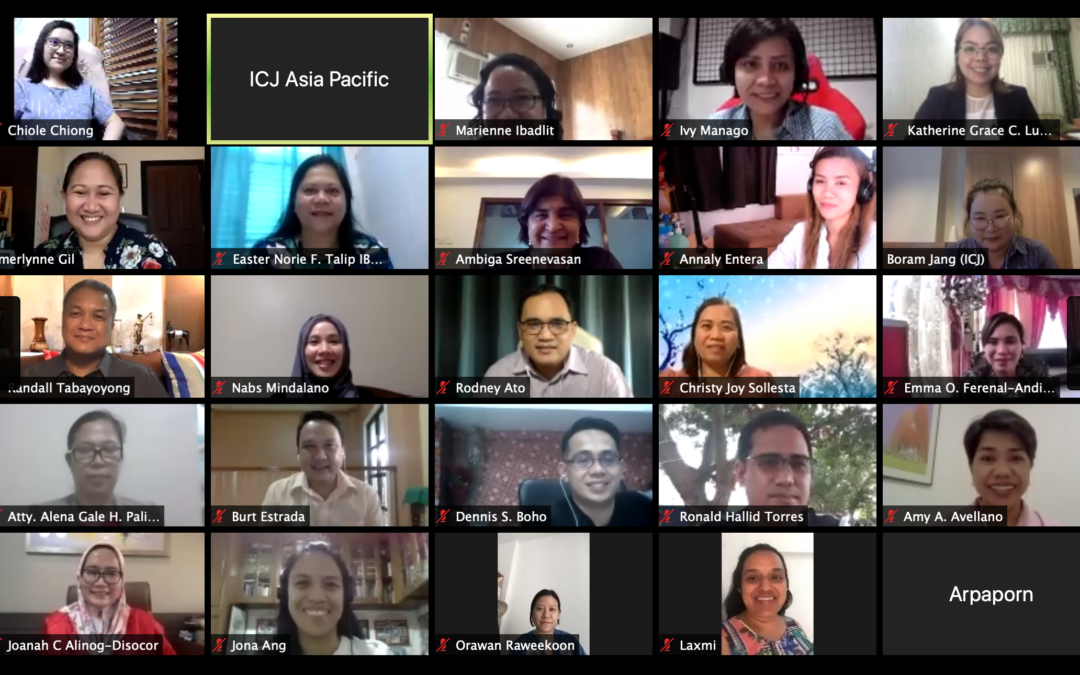
Sep 8, 2020 | Advocacy, News
On 29 August and 5 September, the ICJ collaborated with the Integrated Bar of the Philippines (IBP) to hold a webinar series for legal aid providers in the Philippines on eliminating gender discriminatory attitudes and behaviors towards women.
Members of IBP’s legal aid committees from the Eastern and Western Mindanao Regions participated in these webinars, focused on gender stereotypes and discriminatory practices that exist in the legal profession and in the work of legal aid providers who directly engage with women when they seek justice.
Dato Ambiga Sreenevasan, ICJ’s Commissioner from Malaysia, addressed the promotion and protection of women’s human rights in the context of the legal profession: “While conditions for women have improved, there is still work to be done to achieve equality between men and women in the legal profession. At the entry level, things appear to be going well, but we must look also at women’s opportunities throughout their legal career and question why it is the case that some areas are still male-dominated.”
Mikiko Otani, ICJ’s Commissioner from Japan and a member of the UN Committee on the Rights of the Child, spoke about how gender stereotypes and gender discrimination hinder women from accessing justice. “The Bar should be at the forefront of advocating for improvement in legal structures that would help eliminate gender discrimination,” she said.
The Philippines had previously featured as one of the top ten performers in addressing gender disparities, as measured by the World Economic Forum’s Global Gender Gap Index. However, it has recently fallen to rank 16th out of 153 countries. Emerlynne Gil, ICJ Senior International Legal Adviser, acknowledged various measures adopted by the Philippines to implement the Convention on the Elimination of All Forms of Discrimination Against Women (CEDAW), such as the adoption of the Anti-Violence Against Women and Children Act and the Magna Carta for Women. She noted, however, that the Philippines still must do a great deal more.
“The existing culture of impunity and lack of effective remedies for women to access the justice system are just some of the difficult challenges the country faces that prevent it from achieving this goal,” Emerlynne Gil said.
The webinar series also featured a discussion on specific challenges faced by women when accessing justice during the COVID 19 pandemic and in the context of the “drug war” in the Philippines. The lawyers discussed their role and also that of the Bar as an institution to immediately identify and eliminate these gender stereotypes to ensure their clients’ right to access to justice.
Judge Amy Alabado Avellano, a Regional Trial Court judge in the Philippines led this discussion. Attorney Burt Estrada, IBP Executive Vice President, and Attorney Marienne Ibadlit, former IBP Governor for Western Visayas, also held a dialogue with the lawyers on how the IBP as a professional association for lawyers in the Philippines could contribute towards enhancing access to justice for women in the country.
Contact
For questions and clarifications, please contact Ms. Emerlynne Gil, Senior International Legal Adviser, t: +662 619 8477 (ext. 206); e: emerlynne.gil(a)icj.org.
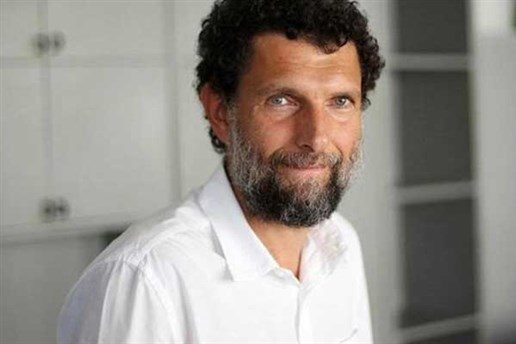
Sep 7, 2020 | News
Turkish authorities should immediately release human rights defender Osman Kavala, in compliance with the Council of Europe Committee of Ministers’ decision of 3 September 2020, the International Commission of Jurists (ICJ), Human Rights Watch and the Turkey Human Rights Litigation Support Project said today.
The decision followed a Committee of Ministers hearing to assess the execution of the judgment of the European Court of Human Rights in the case of Osman Kavala. The Committee, acting in its supervisory capacity for Court Judgments, ordered the Turkish authorities, “to ensure the applicant’s immediate release,” pointing to, “a strong presumption that his current detention is a continuation of the violations found by the Court.”
“After the finding by the European Court of Human Rights that Kavala’s detention is unlawful, the Committee of Ministers has affirmed that Turkey is continuing to violate his rights by keeping him in detention” said Roisin Pillay, director of the Europe and Central Asia Programme at the International Commission of Jurists. “European Court rulings are binding, and Osman Kavala should be released immediately.”
Despite the unlawful detention and an acquittal by the Turkish criminal court presiding over his trial, Osman Kavala has been kept behind bars under a newly issued charge of “espionage” since March 2020. His lawyers are currently challenging the lawfulness of the detention before Turkey’s Constitutional Court. However, the Committee of Ministers indicated in its decision that Turkey should not wait for a ruling of the Constitutional Court but should release Kavala immediately.
In June, the ICJ, Human Rights Watch and the Turkey Human Rights Litigation Support Project made a detailed submission to the Committee of Ministers of the Council of Europe, which oversees enforcement of European Court of Human Rights judgments. The submission argued that the sequence of events and repeated local court decisions to ensure Kavala’s detention subsequent to the European Court’s ruling in December 2019 demonstrated that Turkey was prolonging the violations found by the European Court.
The European Court judgment in Kavala v. Turkey (Application no. 28749/18) found violations of the following provisions of the European Convention on Human Rights: Article 5(1) (right to liberty and security), Article 5(4) (right to a speedy decision on the lawfulness of detention), and the rarely used Article 18 (limitation on use of restrictions on rights) taken together with Article 5(1). The Court required Turkey to release Kavala and said that any continuation of his detention would prolong the violations and breach the obligation to abide by the judgment in accordance with Article 46(1) of the Convention.
The judgment on Osman Kavala’s case is particularly significant because it is the first final ruling of the European Court of Human Rights against Turkey in which the Court determined that, in interfering with an individual’s rights, Turkey acted in bad faith and out of political motivations, violating Article 18 of the European Convention on Human Rights. The Court said that by detaining Kavala since November 2017 and prosecuting him, the Turkish authorities had “pursued an ulterior purpose, namely to silence him as human rights defender.”
Kavala has been held in detention since November 2017, initially on bogus allegations that he used the 2013 Istanbul Gezi Park protests as a pretext for an attempt to overthrow the government, and that he was involved in the July 15, 2016 attempted military coup. On February 18, 2020, Kavala and his eight co-defendants were acquitted on charges of “attempting to overthrow the government by force and violence” in the Gezi Park trial.
But Kavala was not released, and a court ordered his detention again immediately on one of the grounds for his initial detention on 1 November 2017, namely the charge of “attempting to overthrow the Constitution by force and violence” because of the ongoing July 15, 2016 coup attempt-related investigation against him. Turkey’s President Recep Tayyip Erdoğan had publicly criticized his acquittal just before he was detained again. Weeks later a court ordered his detention a second time on another charge (“espionage”) but under the same investigation file on the coup attempt and relying on the same evidence.
“The decision by the Council of Europe Committee of Ministers confirms our submission that political considerations are behind the court orders prolonging Osman Kavala’s detention , and that there has been a concerted official effort to prevent Kavala’s release,” said Emma Sinclair-Webb, Turkey director at Human Rights Watch.
“Instead of complying with the European Court’s judgment, Turkey has continued to violate Kavala’s human rights.”
The targeted harassment in Turkey of rights defenders is part of a wider practice of arbitrary detentions and abusive prosecutions of journalists, elected politicians, lawyers, and other perceived government critics. This practice has been well-documented in many reports by the Council of Europe, the European Union, and human rights organizations.
“The campaign of persecution against Osman Kavala and the failure to release him and drop all charges have perpetuated a chilling environment for all human rights defenders in Turkey,” said Ayşe Bingöl Demir, co-director of the Turkey Human Rights Litigation Support Project.
“Ending this blatantly unlawful detention, which has been ongoing for over 1000 days, will not only play a role in preventing further violations to Osman Kavala’s rights, it will also give a strong signal to the human rights defenders community that the oversight mechanisms in place to ensure Turkey’s compliance with its international human rights obligations can still be effective.”
Contact:
Róisín Pillay, Director of ICJ’s Europe and Central Asia Programme, t: +32-2-734-84-46 ; e: roisin.pillay(a)icj.orgMassimo Frigo, Senior Legal Adviser, ICJ’s Europe and Central Asia Programme, t: +41-79-749-99-49 ; e: massimo.frigo(a)icj.org ; Twitter: @maxfrigo
Türkiye: Osman Kavala Serbest Bırakılmalı
Yetkililer, Avrupa Konseyi’nin İnsan Hakları Savunucusunu Serbest Bırakma Kararına Uymalıdır
(Cenevre, 7 Eylül 2020) Uluslararası Hukukçular Komisyonu (ICJ), İnsan Hakları İzleme Örgütü ve Türkiye İnsan Hakları Davalarına Destek Projesi, yaptıkları açıklamada Türkiye makamlarının insan hakları savunucusu Osman Kavala’yı Avrupa Konseyi Bakanlar Komitesinin 3 Eylül 2020 tarihli kararına uygun olarak derhal serbest bırakması gerektiğini ifade etti.
Bu karar, Osman Kavala davasında Avrupa İnsan Hakları Mahkemesi’nin kararının uygulanmasını değerlendiren Bakanlar Komitesi oturumunu müteakiben alındı. Mahkeme kararlarının uygulanmasını denetleme yetkisi olan Komite, Türk makamlarına “başvuranın derhal serbest bırakılmasını sağlama” talimatı vererek “mevcut tutukluluğunun mahkeme tarafından tespit edilen ihlallerin devamı olduğuna dair güçlü bir karine bulunduğuna” işaret etti.
Uluslararası Hukukçular Komisyonu Avrupa ve Orta Asya Programı Direktörü Roisin Pillay,” Avrupa İnsan Hakları Mahkemesi’nin, Kavala’nın tutukluluğunun hukuka aykırı olduğunu tespit etmesinden sonra, Bakanlar Komitesi, Türkiye’nin Kavala’nın tutukluluğunu sürdürerek onun haklarını ihlal etmeye devam ettiğini doğruladı” dedi. Pillay, “Avrupa Mahkemesi kararları bağlayıcıdır ve Osman Kavala derhal serbest bırakılmalıdır” dedi.
Hukuka aykırı tutukluluğuna ve davasının görüldüğü Ceza Mahkemesinin verdiği beraat kararına rağmen, Osman Kavala yeni ileri sürülen bir “casusluk” suçlaması nedeniyle Mart 2020’den bu yana parmaklıklar ardında tutulmaya devam ediliyor. Kavala’nın avukatları, Türkiye’nin Anayasa Mahkemesi önünde tutukluluğun hukuksuz olduğuna ilişkin itirazlarda bulunuyorlar. Ancak Bakanlar Komitesi, kararında Türkiye’nin Anayasa Mahkemesinin vereceği bir kararı beklemeksizin Kavala’yı derhal serbest bırakması gerektiğini işaret ediyor.
Haziran ayında, ICJ, İnsan Hakları İzleme Örgütü ve Türkiye İnsan Hakları Davalarına Destek Projesi, Avrupa İnsan Hakları Mahkemesi kararlarının uygulanmasını denetleyen Avrupa Konseyi Bakanlar Komitesi’ne ayrıntılı bir bildirim sundu. Bildirim, Avrupa Mahkemesi’nin Aralık 2019’daki kararının ardından Kavala’nın alıkonmasını sağlamak için gelişen olaylar serisinin ve tekrarlanan yerel mahkeme kararlarının, Türkiye’nin Avrupa Mahkemesi tarafından tespit edilen ihlalleri devam ettirdiğini gösterdiğini savundu.
Avrupa Mahkemesi, Kavala/Türkiye kararında (Başvuru no. 28749/18), madde 5/1 (özgürlük ve güvenlik hakkı), madde 5/4 (alıkonmanın yasaya uygunluğuna ilişkin ivedi karar alma hakkı) ve nadiren kullanılan madde 18 (haklara getirilecek kısıtlamaların sınırlanması) ile birlikte madde 5/1’in ihlal edildiğine karar vermiştir. Mahkeme, Türkiye’nin Kavala’yı tahliye etmesini zorunlu kılmış, tutukluluğunun devam etmesinin ihlalleri devam ettireceğini ve Sözleşmenin 46(1) maddesi uyarınca AİHM kararlarına uyma yükümlülüğünü ihlal edeceğini belirtmiştir.
Osman Kavala kararı, Türkiye’nin kötü niyetle ve siyasi amaçlarla bir bireyin haklarına müdahale ettiğini ve Avrupa İnsan Hakları Sözleşmesi’nin 18. maddesini ihlal ettiğini tespit eden Türkiye aleyhindeki ilk nihai karar olduğundan özel bir önem taşımakta. AİHM, Osman Kavala’yı Kasım 2017’den bu yana alıkoyup yargılayan Türk makamlarının “başvuranın bir insan hakları savunucusu olarak susturulmasını sağlamak için örtülü bir amaç taşıdığını” tespit etmişti.
Kavala, Kasım 2017’den bu yana, 2013 İstanbul Gezi Parkı protestolarını, hükümeti devirme girişimi için kullandığı ve 15 Temmuz 2016 askeri darbe girişimine müdahil olduğu yönündeki asılsız iddialarla tutuklu. 18 Şubat 2020’de Kavala ve diğer sekiz sanık, Gezi Parkı davasında “cebir ve şiddet kullanarak hükümeti ortadan kaldırmaya teşebbüs” suçlamasından beraat etmiştir.
Ancak Kavala cezaevinden tahliye edilmemiş ve bir hakim kararıyla 2016 darbesiyle ilgili devam eden bir soruşturmayla ilişkili olarak “anayasal düzeni cebir ve şiddet kullanarak ortadan kaldırmaya teşebbüs” suçlamasıyla tekrar tutuklanmıştır. Tekrar tutuklanmasından kısa bir süre önce Cumhurbaşkanı Recep Tayyip Erdoğan halka açık şekilde Kavala’nın beraatini eleştirmiştir. Kavala haftalar sonra, yine bu delillere ve soruşturma dosyasına dayanan bir başka suçlama ile (casusluk) bir kez daha tutuklanmıştır.
İnsan Hakları İzleme Örgütü Türkiye Direktörü Emma Sinclair-Webb,” Avrupa Konseyi Bakanlar Komitesi’nin kararı bildirimimizi doğrulamakta, Osman Kavala’nın tutukluluk halini uzatan mahkeme kararlarının arkasında siyasi değerlendirmelerin olduğunu ve Kavala’nın serbest bırakılmasını önlemek için ortak bir resmi çabanın bulunduğunu ortaya koymaktadır” dedi.
Sinclair-Webb, “Avrupa Mahkemesi’nin kararına uymak yerine, Türkiye, Kavala’nın insan haklarını ihlal etmeye devam etmiştir” dedi.
Türkiye’de insan hakları savunucularına yönelik baskı, daha genel olarak gazetecilere, seçilmiş siyasetçilere, hukukçulara, hükümeti eleştirdiği düşünülenlere yönelik keyfi alıkoymalar ve yargısal tacizin bir parçasıdır. Bu uygulama Avrupa Konseyi, Avrupa Birliği ve insan hakları örgütlerine ait birçok raporla belgelendirilmiştir.
Türkiye İnsan Hakları Davalarına Destek Projesi Eş Direktörü Ayşe Bingöl Demir “Kavala’ya karşı yürütülen yıldırma kampanyası, onun tahliye edilmemesi ve hakkındaki suçlamaların düşürülmemesi, Türkiye’deki tüm insan hakları savunucuları için baskı ortamının sürmesine sebep olmuştur” dedi.
“1000 gün boyunca devam eden açıkça hukuka aykırı olan tutukluluğun sona ermesi, yalnız Osman Kavala’nın haklarının daha fazla ihlal edilmesini önlemek konusunda değil, aynı zamanda insan hakları savunucuları topluluğuna Türkiye’nin uluslararası insan hakları yükümlülüklerine uyumunu denetleyen mevcut gözetim mekanizmalarının hala etkili olabileceği yönünde güçlü bir sinyal verecektir.”
İnsan Hakları İzleme Örgütü’nün Türkiye ile ilgili diğer raporları için tıklayınız:
https://www.hrw.org/europe/central-asia/turkey
Daha fazla bilgi için :
İstanbul’da, Emma Sinclair-Webb (İngilizce, Türkçe): +90-538-972-4486 (Whatsapp); ya da sinclae@hrw.org. Twitter: @esinclairwebb
Cenevre’de, Massimo Frigo (İngilizce, Fransızca, İspanyolca ve İtalyanca): +41-79-749-99-49; ya da massimo.frigo@icj.org. Twitter: @maxfrigo
Brüksel’de, Róisín Pillay (İngilizce, Fransızca): +32-2-734-84-46 (cep telefonu); ya da roisin.pillay@icj.org
New York’ta, Aisling Reidy (İngilizce) +1-917-378-3178 (cep telefonu); ya da reidya@hrw.org
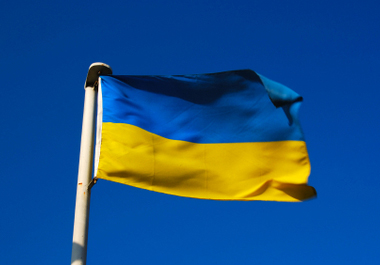
Sep 2, 2020 | Advocacy, Non-legal submissions
The ICJ has made submissions to the Human Rights Committee, today, on Ukraine’s implementation of, and compliance with, the provisions of the International Covenant on Civil and Political Rights.
The ICJ broughtto the Committee’s attention some issues of concern pertaining to Ukraine’s compliance with and implementation of the ICCPR.
This submission highlights a number of concerns relating to the security and independence of lawyers in Ukraine, and their consequences for the protection of certain Covenant rights. In particular, this submission addresses:
- the institutional independence of the legal profession;
- security of lawyers and their right to life;
- restrictions on access to clients and the rights of the defence; and
- security of lawyers and access to justice in uncontrolled territories in Ukraine.
These concerns highlight Ukraine’s lack of compliance with its obligations under the Covenant, including in respect of the right to life under article 6 and the right to a fair trial under article 14, in particular, as well as under other Covenant rights, such as Ukraine’s obligations under articles 2, 7, 9, 10, and 17 of the ICCPR.
Ukraine-ICJ-Submission-CCPR-Advocacy-Non-Legal-Submissions-2020-ENG









